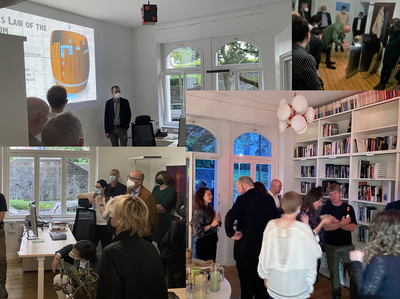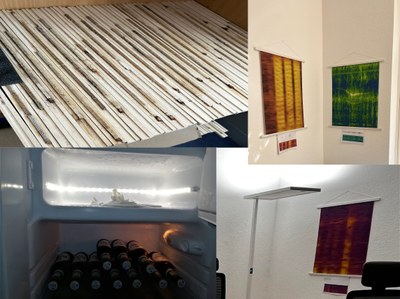Media
26 January 2023 - Planetary Lecture Dr. Kira Vinke - "Sturmnomaden" (german)
The Panel on Planetary Thinking, the DFG Research Group MeDiMi (Human Rights Discourses in the Migration Society) and the Environmental Law Practitioners Seminar of the Justus Liebig University Giessen invite you to attend our upcoming Planetary Lecture:

Lecture
Dr. Kira Vinke: „Sturmnomaden“. Der Klimawandel verlangt eine neue Migrationspolitik
Time: January 26, 2023, 6-8 p.m.
Location: University main building, 3rd floor, seminar room 315.
Durch den Klimawandel dehnen sich Wüsten aus, werden Küsten überspült und reißen Bergrutsche Dörfer und Stadtviertel weg. Dadurch schränken sich die Lebensräume für Menschen weiter ein, eine massive Klimawanderung ist die Folge. Kira Vinke hat mit ihrer Pionierarbeit zu den Sturmnomaden auf die Notwendigkeit einer Politik hingewiesen, die Klimawandel und Biodiversitätsverlust als Fluchtgründe anerkennt und sich dem Thema der globalen Migration neu stellt.
Dr. Kira Vinke is the director of the Center for Climate and Foreign Policy at the German Council on Foreign Relations and co-chair of the German government's Advisory Council on Civilian Crisis Prevention and Peacebuilding. Her research topics include climate impacts, violent conflict, and civil crisis prevention, particularly in South Asia, the Sahel, and the Pacific. Previously, she worked as a consultant for the German Advisory Council on Global Change (WBGU) and as a consultant for the German Society for International Cooperation (GIZ) and the Asian Development Bank. She is also involved in the board of trustees of World Vision Deutschland e.V., as a member of the association of the German section of Action against Hunger, and in the Development Service and Humanitarian Aid Committee of Bread for the World.
Prof. Dr. Jürgen Bast, Chair of Public Law and European Law at JLU and spokesperson for the MeDiMi research group, will open the discussion on Dr. Kira Vinke's lecture with a commentary on "Climate Migration and the Humanization of Refugee Law".
Please note that the lecture will be held in German.
May 10, 2022 - First Planetary Lecture on "Planetary Law" by Prof. Dr. Dr. Louis Kotzé and Networking Event of the Panel
|
The Planetary Lecture Series opened with a talk on "Planetary Law for the Anthropocene." Earth System Law pioneer Prof. Dr. Dr. Louis Kotzé (North West University, South Africa) proposed a transformation of international environmental law in order to respond more appropriately to planetary phenomena than has been the case so far: Instead of humans, legal principles should focus on the Earth System, especially in the so-called Anthropocene. Accordingly, Prof. Kotzé centered his lecture around the question how such Earth System Governance could be designed. A corresponding governance approach should emphasize the planetarily significant shaping power of humans, but always relate this power to planetary forces and consider humanity as part of the Earth System. The full recording of the lecture as well as the following discussion opened by Prof. Dr. Thilo Marauhn (Public Law and International Law, JLU) is available on YouTube. The warm spring weather exceeded expectations and set the scene for the subsequent networking meeting of the panel members. The Panel had invited to the new premises to inaugurate the new 'Planetary Hub' and to introduce the current Fellows and their work to the Panel members. First, Geoscientist Claudia Hartl fascinated the assembled with drill core samples of beech trees from the Rosbach city forest and explanations of their history. Colorful, abstract-looking posters formed the centerpiece of Clemens Finkelstein's short lecture on vibrations. The illustrations show the vibration patterns of various ambient sounds of the panel office: Spectators could marvel at the vibratory signatures of church bells across the street, rail traffic behind the building, and a helicopter flying overhead. However, due to its content the demonstration by Mathias Kessler attracted the most attention: the artist presented his work "The Arctic Ocean - Failed Hope", a refrigerator filled with beer. At first glance an invitation to socialize, a 3D version of Caspar David Friedrich's "The Arctic Ocean" lies hidden in the icebox. By opening and closing it time and again, the slight recurring increases in temperature cause the ice to slowly melt. Hereby, Kessler points to the serious consequences that human actions can have on the planet.
|
|

|

|
